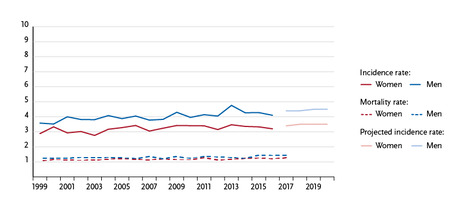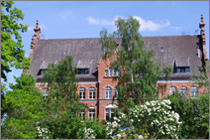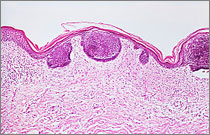Cancer of soft tissue without mesothelioma
| 2020 | ||
|---|---|---|
¹ per 100,000 persons, age-standardised according to the old European standard population * calculated using the period method for 2019 / 2020 | ||
| Women | Men | |
| Incidence | 2,190 | 2,420 |
| Age-standardised incidence rate¹ | 3.4 | 4.0 |
| Deaths | 908 | 927 |
| Age-standardised mortality rate¹ | 1.2 | 1.4 |
| 5-year prevalence | 7,000 | 7,900 |
| 10-year prevalence | 11,100 | 12,900 |
| Relative 5-year survival rate* | 53 % | 63 % |
| Relative 10-year survival rate* | 46 % | 58 % |
This group of cancers includes the rare malignant tumours of the peripheral nerves, connective tissue and other soft tissue as well as the peritoneum and retroperitoneum. It also includes the rare Kaposi sarcoma that occurs on the skin (3 percent of all cancers in the group). In contrast to carcinomas, which predominantly develop from epithelial or glandular tissue, soft tissue tumours generally form from connective tissue structures. Thus, most soft tissue tumours are sarcomas.

![]() Age-standardised incidence and mortality rates by sex, ICD-10 C46-C49, Germany 1999 – 2016/2017, projection (incidence) through 2020, per 100,000 (old European standard population)
Age-standardised incidence and mortality rates by sex, ICD-10 C46-C49, Germany 1999 – 2016/2017, projection (incidence) through 2020, per 100,000 (old European standard population)
Risk factors usually not clear
In most cases of soft tissue sarcoma, no clear cause can be found. Patients with rare hereditary tumour syndromes can develop sarcomas. The presence of one or more genetic mutations probably also influences the risk of the disease.
After radiotherapy, a sarcoma may develop in the irradiated body region in rare cases. Infection with Human herpesvirus 8 (HHV-8) can cause Kaposi sarcoma. In patients with severe immune deficiency, the Epstein-Barr virus (EBV) may also be involved in the development of soft tissue sarcoma.
Environmental toxins and chemicals can possibly contribute to the development of sarcomas. A connection between vinyl chloride exposure and angiosarcoma of the liver has been established. Chronic inflammatory processes probably also increase the risk of soft tissue sarcomas. In addition, chronic lymphoedema following breast removal can in rare cases lead to the development of angiosarcoma (Stewart-Treves syndrome). An influence of diet or other lifestyle factors, such as smoking or alcohol consumption, is not known.
Date: 21.03.2024






